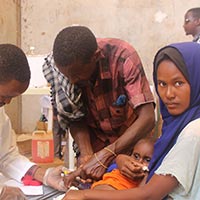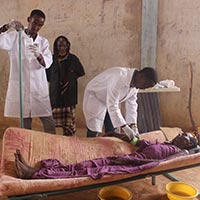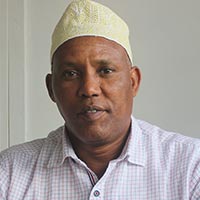Abdi Tari Ali in Gedo, Somalia
I was on my knees fixing IV drips to people’s arms as they lay on the ground in a makeshift treatment centre in the town of Luuq in Gedo Province, southern Somalia.
I have treated cholera before, but I have never seen so many sick people and so few facilities.
Having been trained as a doctor, I felt I couldn’t just watch as the staff were overwhelmed with patients, so I scrubbed up to offer a helping hand. There is no question of normal working hours. Staff are working 24 hour shifts to save lives.
Somalia is facing two major challenges: hunger and cholera. If the long rains don’t come in April, it will be a catastrophe; and there is an urgent need to get the spread of cholera under control.
The charity I work for, Trócaire, has been working for 25 years in the Gedo region, providing health, nutrition and education. The Caritas organisation for Ireland – a sister agency of CAFOD – supports three hospitals, 10 primary health units and four health centres in this region.
The drought is one of the worst in living memory. A famine in 2011 left over a quarter of a million people dead, but the current drought is far more severe and protracted than the one six years ago, and millions are on the brink of starvation.
Crops have been destroyed and many villages have been left without water. Most Somalis in Gedo region are pastoralists, but their animals have been wiped out. People are walking 90 kilometres to this region in the search of water for their cattle, or because they want to get to Ethiopia, but the border has been sealed, so they are stuck in camps for internally displaced persons (IDP) where conditions are very bad.
The UN estimates that half of Somalia’s population do not have enough food to eat and are at risk of famine; over 363,000 children are acutely malnourished and 70,000 others are severely malnourished and in need of urgent life-saving support.
 We have seen over 40,000 cases of sick children in our hospitals and health centres: malnourished, with diarrhoea, or respiratory infections because they are sleeping without proper shelter. Our feeding programme for children has increased from 9,000 to 12,000 and we have scaled up in 13 more villages.
We have seen over 40,000 cases of sick children in our hospitals and health centres: malnourished, with diarrhoea, or respiratory infections because they are sleeping without proper shelter. Our feeding programme for children has increased from 9,000 to 12,000 and we have scaled up in 13 more villages.
But we are completely overstretched. Children are the first victims of hunger. You see straight away from their puffy faces, thin hair and swollen bellies and feet that they are malnourished. If you press down on the skin, you leave a dent. There is no elasticity left.
Trócaire don’t do blanket feeding, instead focusing on the most vulnerable with wet feeding and food baskets. Yet the needs are blanket. We do quick tests for malnutrition for the children as they arrive and put them straight into the feeding programme.
As the crisis worsens, as well as nutritional support in clinical care locations, Trócaire will be doing more school feedings. In 2011, increased school dropouts correlated with high levels of famine, and food interventions at school level are critical for food security and support families to keep their children in school.
Hunger is not our only challenge: cholera cases are soaring. Conditions in the IDP camps are unhygienic, there is a lack of clean water and people are weak from hunger. One case of cholera can quickly infect a whole camp or village.
Yet cholera is easy to treat, as long as sufferers reach help fast. People are being carried 20 kilometres on stretchers or camels. We don’t know how many have died on the way. If the patient doesn’t get assistance in six hours, you lose them – 100 percent. Cholera kills quickly – losing fluids from your body followed swiftly by organ failure if you are not treated promptly. Children die even quicker.
 Trócaire has established two cholera treatment centres, where people receive treatment such as rehydration and antibiotics. The 30 beds in the acute diarrhoea and cholera treatment centre I visited in Luuq are sadly not enough for the hundreds of cases. Medicine is used up as soon as it arrives. The lucky ones have a bed, but many more are outside or being treated on the floor. We are in urgent need.??Funds raised in the UK by our sister agency CAFOD - through their East Africa Crisis Appeal - support this vital, life-saving work. We are extremely grateful to Britain’s Disasters Emergency Committee (DEC) and its 13 agencies, of which CAFOD is a member, for their generous support – raising £50million – for people facing famine across East Africa. In 2017, no one should die from hunger or lack of medical care.
Trócaire has established two cholera treatment centres, where people receive treatment such as rehydration and antibiotics. The 30 beds in the acute diarrhoea and cholera treatment centre I visited in Luuq are sadly not enough for the hundreds of cases. Medicine is used up as soon as it arrives. The lucky ones have a bed, but many more are outside or being treated on the floor. We are in urgent need.??Funds raised in the UK by our sister agency CAFOD - through their East Africa Crisis Appeal - support this vital, life-saving work. We are extremely grateful to Britain’s Disasters Emergency Committee (DEC) and its 13 agencies, of which CAFOD is a member, for their generous support – raising £50million – for people facing famine across East Africa. In 2017, no one should die from hunger or lack of medical care.
Working with long-standing and trusted local partners, who have been in Somalia for decades, means we can harness local knowledge and access those who are most vulnerable: we are there before the crisis, and will continue to support families long into the future as they look to recover and rebuild their lives.
• Abdi Tari Ali is the Somalia Programme Manager for Trócaire.
• Help save lives by donating to CAFOD’s East Africa Crisis Appeal
21 April 2017, The Tablet
I have treated cholera before, but I have never seen so many sick people and so few facilities
 Loading ...
Loading ...



What do you think?
You can post as a subscriber user ...
User comments (0)